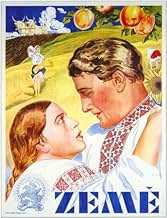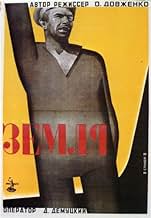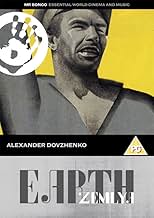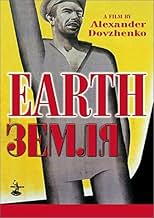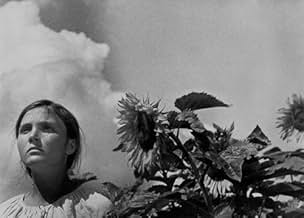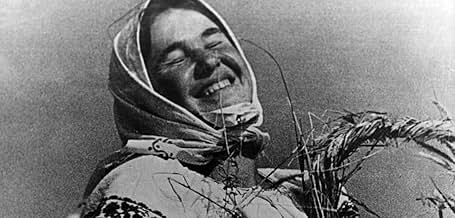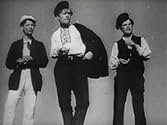NOTE IMDb
7,2/10
6,8 k
MA NOTE
Dans la campagne paisible, Vassily s'oppose aux riches kulaks contre l'arrivée de l'agriculture collective.Dans la campagne paisible, Vassily s'oppose aux riches kulaks contre l'arrivée de l'agriculture collective.Dans la campagne paisible, Vassily s'oppose aux riches kulaks contre l'arrivée de l'agriculture collective.
- Réalisation
- Scénario
- Casting principal
- Récompenses
- 1 victoire et 1 nomination au total
Stepan Shkurat
- Opanas
- (as S. Shkurat)
Semyon Svashenko
- Vasyl - son of Opanas
- (as S. Svashenko)
Yuliya Solntseva
- Daughter of Opanas
- (as Yu. Solntseva)
Yelena Maksimova
- Natalya - Vasyl's fiancee
- (as Ye. Maksimova)
Nikolai Nademsky
- Ded Semyon
- (as N. Nademsky)
Ivan Franko
- Kulak Belokon
- (as I. Franko)
Pyotr Masokha
- Khoma - son of kulak Belokon
- (as P. Masokha)
Vladimir Mikhaylov
- Priest
- (as V. Mikhaylov)
Pavel Petrik
- Young Party-Cell Leader
- (as P. Petrik)
P. Umanets
- Chairman of the Village Soviet
- (as Umanets)
Luka Lyashenko
- Young Kulak
- (as L. Lyashenko)
Vasiliy Krasenko
- Old Peter
- (non crédité)
M. Matsyutsia
- Farm Girl
- (non crédité)
Avis à la une
10miloc
From its opening, with an elderly man dying surrounded by impassive adults and obliviously playing children, to its wildly emotional finale, this breathtaking silent work transcends its politics and functions as poetry. It's unmistakeably Soviet -- the messianic fervor of the scene in which the farming community greets the arrival of a tractor would seem like parody if it weren't for Dovzhenko's extraordinary sense of lyricism. Using repeated shots of the expectant farmers crying out "It's coming!" intercut with an empty horizon, he builds the moment so completely that you're excited in spite of yourself; you totally believe in that tractor. (As one of the "rich farmers" says, shellshocked by this threat to their future, "It's a fact. It's here.")
To call the film propaganda, while true, seems rather beside the point. Aren't all films? Dovzhenko's manipulations are certainly no less devious than those of western film. Switch the communist message to a patriotic or even capitalist one, and the setting to the World War II Pacific or the old west or wherever you choose and it's no different than, say, "Shane" or "Gone With the Wind" or "The Passion of the Christ" -- just much, much better.
The story, told in rich montages of motionless figures, fruit, machinery, skies, rippling fields, and above all faces, weaves its "official" message about collective farms and private property with larger themes of religion, the generation gap, and the cycle of life: the Earth that gives life takes it away. A group of children giggle and spy on an old man listening at his friend's grave for a last message; a man sits up on his deathbed to eat a last sweet pear; a serious young radical, alone, gives himself up to a joyful moonlit dance before falling into the dirt. Dovzhenko's approach has less to do with narrative than with creating visual textures; it looks as though Terrence Malick watched this more than a few times before making "Days of Heaven." Dovzhenko's discontinuities and repetitions can be initially bewildering, but they pack a concrete wallop. The images accumulate and crystallize, carrying greater and greater weight, and, as an aging farmer becomes suddenly radicalized by tragedy, the direct shots of his face, hardening in bewilderment and outrage, take on a thunderous power.
To call the film propaganda, while true, seems rather beside the point. Aren't all films? Dovzhenko's manipulations are certainly no less devious than those of western film. Switch the communist message to a patriotic or even capitalist one, and the setting to the World War II Pacific or the old west or wherever you choose and it's no different than, say, "Shane" or "Gone With the Wind" or "The Passion of the Christ" -- just much, much better.
The story, told in rich montages of motionless figures, fruit, machinery, skies, rippling fields, and above all faces, weaves its "official" message about collective farms and private property with larger themes of religion, the generation gap, and the cycle of life: the Earth that gives life takes it away. A group of children giggle and spy on an old man listening at his friend's grave for a last message; a man sits up on his deathbed to eat a last sweet pear; a serious young radical, alone, gives himself up to a joyful moonlit dance before falling into the dirt. Dovzhenko's approach has less to do with narrative than with creating visual textures; it looks as though Terrence Malick watched this more than a few times before making "Days of Heaven." Dovzhenko's discontinuities and repetitions can be initially bewildering, but they pack a concrete wallop. The images accumulate and crystallize, carrying greater and greater weight, and, as an aging farmer becomes suddenly radicalized by tragedy, the direct shots of his face, hardening in bewilderment and outrage, take on a thunderous power.
10Rigor
This great masterpiece of Soviet cinema has images so powerful and an editing technique so bold that at times the narrative is transcended. By this I mean that the film goes beyond it's original intention of arguing for changes from individualistic to more technologized and collective agricultural strategies and becomes a kind of realization of what a "liberated" agricultural zone would really look and feel like. This is a film ripe with the excitement of the creation of a new art to match a hopeful new world. It hardly needs to be mentioned that Stalinsit forces decried the final results of this masterpiece; calling it decadent and stylistically elitist. In actuality the film is too Marxist (I would go so far as to say too Leninist) for Stalinism. The film respects the ability of the viewer (and the viewers were assumed to be proletariat working class and agricultural workers) to grapple with rigorous ideas and images and to function outside of the narrative frame of individualistic melodrama. Like many early Soviet films this work seems not only ahead of its time, but, actually ahead of ours.
Now I regret all the times I've railed about how propaganda is synonymous with contempt for the audience. It is sometimes hard to know what to say about a movie when it is a 'best of all time list' warhorse, but not this time. I have never - ever - seen a movie with a more deliberate, or surer, sense of rhythm. Two sequences that are nothing but long montages of fruit are absolutely riveting. A man sits, re-evaluating his world view, and because it takes a long time to do that we fade to black THREE times over about a minute, without him moving or changing position. This glacial tempo lulls us, so that Dovzhenko can jolt us with the arrival of a speedy tractor; or a collectivo's joyous dance through the dust over several lengthy wide shots is disrupted by his abrupt murder. Then the movie climaxes with an unbelievable crescendo where at least FIVE events are montaged, in perfectly comprehensible rhetorical construction. The movie begins with a death scene whose understated acting is mind-boggling even now, forget 1930; the final shot balances all the anti-church rhetoric with an image that is absolutely redemptive and spiritual, only the point is that redemption is found in LIFE. I'm not being pompous, this movie actually functions on that level. It achieves poetry AND propaganda in a way that I've never ever experienced before. It kind of reminds me of Brian Wilson's "Smile" in its modest grandeur, so true that it's painful, but so f***ing great that you want to experience it again and again. You can get it for free at the St. Catharines Library.
Stalin may have wanted an ode to collective agriculture; what he got instead was a hymnal to mother nature and the toiling offspring who dwell in her bosom. Those opening shots of pulsating fields waving in the wind have no equal for sheer evocative power. Earth is revealed at once as a living, breathing being and bountiful provider. Flower, fruit, decay, renewal -- nature's timeless cycle. The soundless imagery is at times so wonderfully lyrical that contemporary viewers may be led to recognize how much has been lost to the technology-driven cinema of today. Even the occasional plot crudities are rescued by a style that is both brilliant and unerringly pictorial. Close-ups of weather-worn peasants, a lone kulak and oxen beneath an immense sky, great rolling plains and far horizons of the Ukrainian breadbasket -- this is the sheer lyrical sweep of the Dovchenko masterpiece, a montage that transcends all obstacles, real and man-made. Not even the estimable John Ford frames primitive elements as grandly as this. There are flaws. Too many rushing crowd scenes appear without purpose, except to mimic Eisenstein's "march of history", while the propaganda thread at times blends uneasily with the lyrical. Still and all, Dovchenko pulls off the theme of new beginning more seamlessly than might be expected. Far from being a mere relic of the silent era, or an ode to Stalinist collectivism, Earth remains an enduring testament to the power of cinema as sheer visual poetry.
The film ends with a stunning panorama of humanity, a set of images alternately showing; a man running mad, a priest beseeching god to punish, a nude woman raving mad, another going into labor, a funeral procession of stern, solemn faces. So it is all there, with life as this dance between sorrow and new life, between damnation and transcendence
It has all been set in motion by the eye though, the Soviet eye that doesn't contemplate but animates by seeing. In Zvenigora it was the statuesque officer of the Red Army as emblematic of Soviet spirit; here it is the young farmer driving a tractor.
So look how it all transpires, it's more knowledge than film courses offer in a year. Before life was clear, content with unjust hardship and small pleasure - images show tilted skies, fields of hay rolling in the wind, and the old man quietly submitting to the prescribed fate - but with the arrival of the tractor, and so this mechanical eye literally plowing through the frame, it's all vigorously animated in a chorus, a frenzy of splintered image. The scenes of production are so powerfully abstract I register them on a cosmologic level; they might as well be a lost reel from the first moments of the universe, in fact, they are, astutely so, about the genesis of a new world and new life from it, Soviet in this case.
In this new life machines are the engines forward. Man as this machine. In something that could read like the ravings of some futurist manifesto, the young man preaches this new word to an assembly of villagers. So even though, like all silent films, it reaches us as a museum piece, we can and must reclaim it; it is a vigorous cinema pounding with the youthful vision of a new society.
Oh, the failings of that society to materialize as prescribed are known to most, and neither here nor there. The thing is this; the struggle was thought to matter, and so this cinema, perfectly centered in that struggle, provided voice that mattered, the song to work the fields to.
Such voice we find in the powerful metaphor that ends the film. There is fruit everywhere, on the ground, or hanging from branches, and it's pouring down hard; it rains and rains but it is all silently endured and what was thought for a moment that would break life away was merely what washed it clean, watered it to grow.
You may hear that Dovzhenko was a Malick of the time who made his art for the masses. Rather it's the other way around; I like Malick, but there is a tinge of sadness compared to a work like this, that his talents - or anyone's for that matter for a long time - cannot hope to animate, and be animated by, a new world anymore and we're merely chronicling our despairs.
It's all so perfectly centered in a worldview, this one probably the final step in the Soviet cinematic sojourn before sound and censors scattered these makers in the four winds. Only the Japanese centered deeper. Oh, it's a sermon alright; but a sermon that washes perception clean.
It has all been set in motion by the eye though, the Soviet eye that doesn't contemplate but animates by seeing. In Zvenigora it was the statuesque officer of the Red Army as emblematic of Soviet spirit; here it is the young farmer driving a tractor.
So look how it all transpires, it's more knowledge than film courses offer in a year. Before life was clear, content with unjust hardship and small pleasure - images show tilted skies, fields of hay rolling in the wind, and the old man quietly submitting to the prescribed fate - but with the arrival of the tractor, and so this mechanical eye literally plowing through the frame, it's all vigorously animated in a chorus, a frenzy of splintered image. The scenes of production are so powerfully abstract I register them on a cosmologic level; they might as well be a lost reel from the first moments of the universe, in fact, they are, astutely so, about the genesis of a new world and new life from it, Soviet in this case.
In this new life machines are the engines forward. Man as this machine. In something that could read like the ravings of some futurist manifesto, the young man preaches this new word to an assembly of villagers. So even though, like all silent films, it reaches us as a museum piece, we can and must reclaim it; it is a vigorous cinema pounding with the youthful vision of a new society.
Oh, the failings of that society to materialize as prescribed are known to most, and neither here nor there. The thing is this; the struggle was thought to matter, and so this cinema, perfectly centered in that struggle, provided voice that mattered, the song to work the fields to.
Such voice we find in the powerful metaphor that ends the film. There is fruit everywhere, on the ground, or hanging from branches, and it's pouring down hard; it rains and rains but it is all silently endured and what was thought for a moment that would break life away was merely what washed it clean, watered it to grow.
You may hear that Dovzhenko was a Malick of the time who made his art for the masses. Rather it's the other way around; I like Malick, but there is a tinge of sadness compared to a work like this, that his talents - or anyone's for that matter for a long time - cannot hope to animate, and be animated by, a new world anymore and we're merely chronicling our despairs.
It's all so perfectly centered in a worldview, this one probably the final step in the Soviet cinematic sojourn before sound and censors scattered these makers in the four winds. Only the Japanese centered deeper. Oh, it's a sermon alright; but a sermon that washes perception clean.
Le saviez-vous
- AnecdotesSoviet censors made Aleksandr Dovzhenko eliminate a number of scenes from the film, including the scene of peasants urinating into a tractor radiator, and the scene of nude woman mourning over her dead fiance. The original uncut version was screened in Ukrainian republic when first released, and then in the Museum of Modern Art (New York City, USA) about 40 years later, on 10 October 1969.
- Versions alternativesIn 1997, the film was re-released in Germany by ZDF, with a new score composed by Alexander Popov. This version was digitally improved (known as Arte Edition), then released on DVD and distributed by the absolut MEDIEN GmbH in 2006. The running time is 78 minutes. The crew participants:
- Alexander Popov, Composer;
- Frank Strobel, Conductor;
- Evgeniy Nikulskiy, Sound engineer;
- Nina Goslar, Commissioning editor.
- ConnexionsEdited into Le tombeau d'Alexandre (1993)
Meilleurs choix
Connectez-vous pour évaluer et suivre la liste de favoris afin de recevoir des recommandations personnalisées
- How long is Earth?Alimenté par Alexa
Détails
- Durée
- 1h 15min(75 min)
- Mixage
- Rapport de forme
- 1.33 : 1
Contribuer à cette page
Suggérer une modification ou ajouter du contenu manquant


